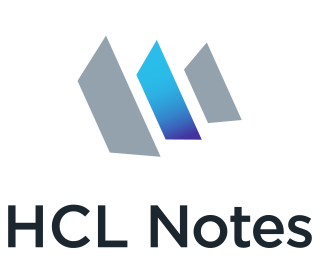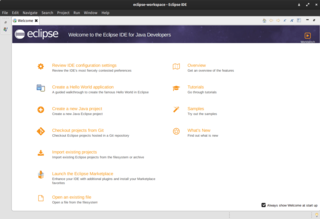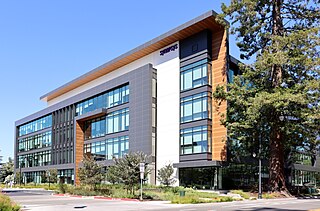Related Research Articles

HCL Notes is a proprietary collaborative software platform for Unix (AIX), IBM i, Windows, Linux, and macOS, sold by HCLTech. The client application is called Notes while the server component is branded HCL Domino.

Eclipse is an integrated development environment (IDE) used in computer programming. It contains a base workspace and an extensible plug-in system for customizing the environment. It is the second-most-popular IDE for Java development, and, until 2016, was the most popular. Eclipse is written mostly in Java and its primary use is for developing Java applications, but it may also be used to develop applications in other programming languages via plug-ins, including Ada, ABAP, C, C++, C#, Clojure, COBOL, D, Erlang, Fortran, Groovy, Haskell, HLASM, JavaScript, Julia, Lasso, Lua, NATURAL, Perl, PHP, PL/I, Prolog, Python, R, Rexx, Ruby, Rust, Scala, and Scheme. It can also be used to develop documents with LaTeX and packages for the software Mathematica. Development environments include the Eclipse Java development tools (JDT) for Java and Scala, Eclipse CDT for C/C++, and Eclipse PDT for PHP, among others.

Synopsys, Inc. is an American electronic design automation (EDA) company headquartered in Sunnyvale, California, that focuses on silicon design and verification, silicon intellectual property and software security and quality. Synopsys supplies tools and services to the semiconductor design and manufacturing industry. Products include tools for logic synthesis and physical design of integrated circuits, simulators for development, and debugging environments that assist in the design of the logic for chips and computer systems. As of 2023, the company is a component of both the Nasdaq-100 and S&P 500 indices.
RPG is a high-level programming language for business applications, introduced in 1959 for the IBM 1401. It is most well known as the primary programming language of IBM's midrange computer product line, including the IBM i operating system. RPG has traditionally featured a number of distinctive concepts, such as the program cycle, and the column-oriented syntax. The most recent version is RPG IV, which includes a number of modernization features, including free-form syntax.
Intrusion Countermeasures Electronics (ICE) is a term used in cyberpunk literature to refer to security programs which protect computerized data from being accessed by hackers.

Andi (Andrei) Gutmans is an Israeli programmer and entrepreneur.

David Heinemeier Hansson is a Danish programmer and racing driver. As a programmer, he is the creator of Ruby on Rails, a software framework for web development. He is also a partner and chief technology officer at the web-based software development firm 37signals.
Laminas Project is an open source, object-oriented web application framework implemented in PHP 7 and licensed under the New BSD License. The framework is basically a collection of professional PHP-based packages. The framework uses various packages by the use of Composer as part of its package dependency managers; some of them are PHPUnit for testing all packages, Travis CI for continuous Integration Services. Laminas provides to users a support of the model–view–controller (MVC) in combination with Front Controller solution. MVC implementation in Laminas has five main areas. The router and dispatcher functions to decide which controller to run based on data from URL, and controller functions in combination with the model and view to develop and create the final web page.

Rogue Wave Software was an American software development company based in Louisville, Colorado. It provided cross-platform software development tools and embedded components for parallel, data-intensive, and other high-performance computing (HPC) applications.
RPG Maker, known in Japan as RPG Tsukūru, is a series of programs for the development of role-playing video games (RPGs) with story-driven elements, created by the Japanese group ASCII, succeeded by Enterbrain, and then by Gotcha Gotcha Games. The Japanese name, Tsukūru, is a pun mixing the Japanese word tsukuru (作る), which means "make" or "create", with tsūru (ツール), the Japanese transliteration of the English word "tool".

Linoma Software was a developer of secure managed file transfer and IBM i software solutions. The company was acquired by HelpSystems in June 2016. Mid-sized companies, large enterprises and government entities use Linoma's software products to protect sensitive data and comply with data security regulations such as PCI DSS, HIPAA/HITECH, SOX, GLBA and state privacy laws. Linoma's software runs on a variety of platforms including Windows, Linux, UNIX, IBM i, AIX, Solaris, HP-UX and Mac OS X.

AppScale is a software company that offers cloud infrastructure software and services to enterprises, government agencies, contractors, and third-party service providers. The company commercially supports one software product, AppScale ATS, a managed hybrid cloud infrastructure software platform that emulates the core AWS APIs. In 2019, the company ended commercial support for its open-source serverless computing platform AppScale GTS, but AppScale GTS source code remains freely available to the open-source community.

JSLint is a static code analysis tool used in software development for checking if JavaScript source code complies with coding rules. It is provided primarily as a browser-based web application accessible through the domain jslint.com, but there are also command-line adaptations. It was created in 2002 by Douglas Crockford.
Hsinchun Chen is the Regents' Professor and Thomas R. Brown Chair of Management and Technology at the University of Arizona and the Director and founder of the Artificial Intelligence Lab. He also served as lead program director of the Smart and Connected Health program at the National Science Foundation from 2014 to 2015. He received a B.S. degree from National Chiao Tung University in Taiwan, an MBA from SUNY Buffalo and an M.S. and Ph.D. in Information Systems from New York University.
JetBrains s.r.o. is a Czech software development private limited company which makes tools for software developers and project managers. The company has its headquarters in Prague, and has offices in China, Europe, and the United States.
Apptio, Inc. is a Bellevue, Washington-based company founded in 2007 that develops technology business management (TBM) software as a service (SaaS) applications. Apptio enterprise apps are designed to assess and communicate the cost of IT services for planning, budgeting and forecasting purposes; Apptio's services offer tools for CIOs to manage technology departments' storage, applications, energy usage, cybersecurity, and reporting obligations; manage the costs of public cloud, migration to public cloud and SaaS portfolios; and adopt and scale Agile across the enterprise.
Jon Paris is a Canadian computer scientist, author, and speaker recognized as one of the top experts on the IBM i platform. In 1987, Jon, then an experienced consultant, was hired by IBM to develop COBOL compilers for the System/36 and System/38 minicomputers. From there, he transitioned into the RPG group, where he played a pivotal role in the development of the modern RPG language as well as other language and development tools, including CODE/400 and Visual Age for RPG. He has also been instrumental in the porting of Python, Ruby, and other languages to the IBM i platform, as well as being a leader in pushing the adoption of completely free RPG. He is also an advocate for PHP on i.
References
- ↑ Withanachchi, Chamara. "Scott Klement" . Retrieved 12 April 2016.
- ↑ Taschler, Joe. "Klement Sausage sold to holding company of San Francisco firm". Milwaukee Journal Sentinel. Retrieved 12 April 2016.
- ↑ "A Mixed Bunch". 27 June 2012. Retrieved 12 April 2016.
- ↑ "IBM i Development Export Scott Klement Joins the Profound Logic Software Team". 11 July 2012. Retrieved 12 April 2016.
- ↑ Rhodes, Ryan (June 2005). "Getting the RPG Word Out" . Retrieved 12 April 2016.
- ↑ Paris, Jon (3 June 2008). "Modern Tools for Today's RPG Programmer" . Retrieved 12 April 2016.
- ↑ Carmel, Shalom (2004). Hacking iSeries.
- ↑ Youens, Andy (29 January 2016). "Using PHP and RPG to Communicate Together Part 2" . Retrieved 12 April 2016.
- ↑ "Fun with QSH, call qp2term and RPG …" . Retrieved 12 April 2016.
- ↑ Klement, Scott. "About Me" . Retrieved 12 April 2016.
- ↑ "IBM Recognizes Top Innovators on iSeries Systems". 15 March 2005. Archived from the original on April 23, 2016. Retrieved 12 April 2016.
- ↑ Vasta, David (22 June 2008). "Scott Klement Honored with Gary Guthrie Writing Award" . Retrieved 12 April 2016.
- ↑ "Biography". 20 February 2007. Retrieved 12 April 2016.
- ↑ "2006 Editorial and Design Regional Award Winners Announced" . Retrieved 12 April 2016.
- ↑ Woodie, Alex (21 October 2013). "Will Modern, Free-Form RPG Bring New Blood To The Platform?" . Retrieved 12 April 2016.
- ↑ Burger, Dan (21 May 2012). "Three IBM i Advocates Elevated to Champion Status" . Retrieved 12 April 2016.
- ↑ "Scott Klement Joins Profound Logic Staff". 16 July 2012. Retrieved 12 April 2016.
- 1 2 3 4 5 6 "Scott Klement Open Source Projects" . Retrieved 12 April 2016.
- ↑ "Using the Expat XML Parser from an RPG Program, Part 1" . Retrieved 12 April 2016.
- ↑ "What's New in V5R4 RPG?". February 2006. Retrieved 12 April 2016.
- ↑ "These are a Few of Our Favorite (Free) Things!". 14 July 2009. Retrieved 12 April 2016.
- ↑ "How to Excel with RPG and Java". 16 September 2004. Retrieved 12 April 2016.
- ↑ "Building JSON with RPG" . Retrieved 12 April 2016.